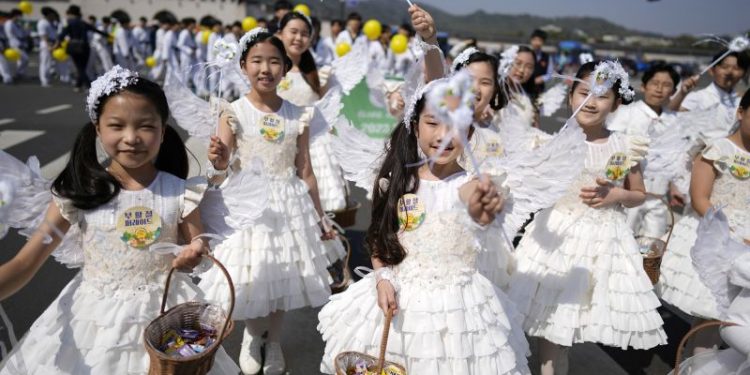South Korea’s leader on Thursday said he plans to create a new government ministry to tackle the “national emergency” of the country’s infamously low birth rate as it grapples with a deepening demographic crisis.
In a televised address, President Yoon Suk Yeol said he would ask for parliament’s cooperation to establish the Ministry of Low Birth Rate Counter-planning.
“We will mobilize all of the nation’s capabilities to overcome the low birth rate, which can be considered a national emergency,” he said.
Speaking later in his first news conference since August 2022, held to mark two years in office, Yoon admitted his administration had fallen short in its efforts to improve people’s lives. He pledged to use the next three years of his term to improve the economy and address low births.
South Korea has the world’s lowest fertility rate, which indicates the average number of children a woman will have in her lifetime. It recorded a rate of just 0.72 in 2023 – down from 0.78 the previous year, the latest drop in a long string of yearly declines.
Countries need a fertility rate of 2.1 to maintain a stable population, in the absence of immigration.
The data underscores the demographic time bomb that South Korea and other East Asian nations are facing as their societies rapidly age just a few decades after their rapid industrialization.
Many European nations also face aging populations, but the speed and impact of that change is mitigated by immigration. Countries like South Korea, Japan and China, however, have shied away from mass immigration to tackle the decline in their working age populations.
Experts say the reasons for these demographic shifts across the region include demanding work cultures, stagnating wages, rising costs of living, changing attitudes toward marriage and gender equality, and rising disillusionment among younger generations.
But despite the economic factors at play, throwing money at the problem has proved ineffective. In 2022, Yoon admitted that more than $200 billion has been spent trying to boost the population over the past 16 years.
Initiatives like extending paid paternity leave, offering monetary “baby vouchers” to new parents, and social campaigns encouraging men to contribute to childcare and housework, have so far failed to reverse the trend.
Experts and residents have instead pointed to some deeper-rooted social issues – for instance, stigma against single parents, discrimination against non-traditional partnerships, and barriers for same-sex couples.
The Japanese government has tried a similar playbook to encourage couples to have children, to no avail – prompting the country’s leader to take urgent action in recent years.
In January 2023, Japanese Prime Minister Fumio Kishida warned that Japan was “on the brink of not being able to maintain social functions” due to the falling birth rate, and announced plans for a new government agency to focus on the issue.
That body, the Child and Families Agency, launched a few months later – intended to tackle a host of issues, from improving children’s health and welfare to supporting families and parents, according to its website.
These measures, ranging from boosting childcare services and providing places for children to play and live, aim to “overcome the declining birthrate” and create a society where people “feel hopeful about getting married, having children, and raising them,” the website says.






